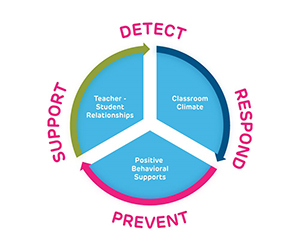Supporting Adults to Address Aggression and Bullying Among Children
Statement of Problem
Bullying—defined as intentional aggressive behavior that typically occurs (or has the potential to occur) repeatedly over time, in the context of a power differential—is widely experienced by school-aged youth and is a common problem in schools. Bullying is associated with numerous negative impacts for all youth, including those who are perpetrators, victims and bystanders. This can include social and emotional difficulties, depression, anxiety, and negative educational and health outcomes. Higher bullying levels in schools can also negatively impact perceptions of safety and how victims and bystanders cope and respond to bullying experiences.
Bullying can be prevented or inadvertently condoned based on adults’ attitudes towards and responses to these behaviors, marking the significance of involving adults in prevention and intervention efforts.
Teachers are particularly impactful supports and change agents for children. Research suggests the importance of training teachers to effectively manage behaviors in their classrooms and intervene with bullying, however, few programs include this type of training. This creates gaps in teachers’ knowledge, attitudes, and skills regarding their role in behavior management as it relates to bullying, which can contribute to inaction and unintentional approval, yielding increased bullying and classrooms that feel less safe. Thus, teacher interventions are key for reducing bullying behaviors.
Parents are also critically important influences on children’s social-emotional health. Children learn rules for social behaviors from parents that provide the foundation for their own social behaviors throughout life, including bullying. Research shows that anti-bullying programs are most effective when parents are included, and their involvement positively impacts children’s behavioral competence and mental health. Unfortunately, few bullying prevention programs successfully involve parents.
Description
Our team has implemented several interventions to give teachers and parents the tools they need to prevent bullying.

The Bullying Classroom Check-Up (BCCU) fills gaps in school-based interventions for teachers by providing consultation and coaching in social-emotional learning (SEL) and trauma-informed classroom management strategies to train teachers to effectively manage their classroom, develop relationships with students, and prevent, detect, and respond to bullying and aggression in the moment. The program also provides authentic practice and support that is responsive to teacher needs and development.
There are three core components of the BCCU intervention:
1) Professional Development (PD) Modules focus on raising awareness and building concrete knowledge, consistency, and a common language about bullying prevention constructs and skills. The PDs provide an introduction and social-emotional framework that establishes the importance of addressing bullying in schools and the role of school staff, as well as strategies for the detection and prevention of bullying, and guidance on how to respond to bullying behavior.
2) Coaching through the Classroom Check-Up (CCU) uses a motivational interviewing technique to explicitly promote teachers’ feelings of efficacy and self-guided changes related to classroom management and instructional practice changes. The BCCU, an adapted version of CCU, includes a strong focus on promoting relationships with students and addressing bullying behaviors. A coach supports teachers through five steps, including:
assessment of the classroom
teacher feedback
goal setting
ongoing coaching
guided practice, including in the TeachLivE© mixed-reality simulator (see below)
Over time, coaching supports are phased out and the teacher self-monitors progress.
3. TeachLivE© Simulator is an immersive, mixed-reality (i.e., part real, part synthetic) simulator in which the teacher interfaces through video and audio with five two-dimensional, computer-generated and animated student avatars. TeachLivE© is not scripted—the student avatars respond to teachers in real time with true-to-life student behaviors and responses that are enacted by trained live voice-actors. TeachLivE© allows for guided practice of new goals and skills and individualized feedback before teachers use them in their classroom. Teachers deliver a lesson in the simulator three times, and the experience mimics a real classroom environment.
In a separate line of research, we developed a range of empirically based Parent Workshops that are flexibly offered by our research team in partnering Philadelphia schools. The workshops and related resources cover topics to help parents support their children with emotion regulation, peer conflict and aggression, bullying, and cyber conflict/bullying. There is also a module to support the emotional well-being of parents so they are best positioned to support their children. These workshops were developed in response to research demonstrating the importance of parent involvement in effective SEL and anti-bullying programs and the scarcity of empirically supported programs designed specifically for parents.
Next Steps
A multi-site, 32-school (50% of schools located in Philadelphia) effectiveness trial of the BCCU is currently underway with funding from the National Institute of Child Health and Human Development. Findings from this trial will guide future research and dissemination efforts. We also seek to broaden the dissemination and evaluation of our parent workshops and increase the historically limited parent participation in anti-bullying efforts.
Additionally, in an effort to empower a range of adults to help children navigate peer difficulties, we seek to combine systems of support to strengthen program effects, including programming for non-teaching staff (e.g., playground and lunchroom supervisors) and other needed supports gleaned from qualitative feedback from school and community stakeholders.
This project page was last updated in October 2023.
Suggested Citation
Children's Hospital of Philadelphia, PolicyLab. Supporting Adults to Address Aggression and Bullying Among Children [Online]. Available at: http://www.policylab.chop.edu. [Accessed: plug in date accessed here].